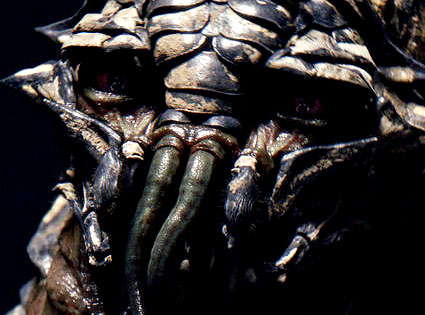
I was only half joking about it being Halo.
Yes, yes, I know….Steven Spielberg is being rumored to direct the upcoming Halo movie. In a way, this totally makes sense. Spielberg knows how to blockbusterize aliens, so I’m sure he’ll completely sterilize the Halo mythology from any lingering remnants of video game lameness and turn Master Chief into a lonely, isolated young boy, man or teenager looking to connect to some other human and/or extraterrestrial beings.
I’d pay to see that.
Even if Shia LaBeouf end up as MC.
Except, I get the sinking suspicion I’ve already paid to see Halo in the form of District 9.
I’m not saying that it apes the video game series or blatantly steals ideas from it. In fact, it’s quite the opposite. District 9 is an incredibly original take on the classic sci-fi standby of first encounters between humans and aliens.
So, it didn’t copy Halo. It just cut Halo.
Consider these very important facts.
Peter Jackson signed on to produce the Halo movie. After viewing a short film entitled 'Alive in Joburg', he was so impressed that he asked the young director of that short film to make some teaser trailers for a new Halo movie. Unimpressed and wary of handing such a multi-million dollar franchise to a rookie directior, movie studies passed on the Halo project and it fell into limbo. That rookie director’s name?
Neil Blomkamp.
The director of District 9.
The producer of District 9?
Peter Jackson.
So, essentially, here’s what happened.
Big name studios didn’t have the stones to go with a new director for a ginormously huge gold mine, so they passed. Since they already had a bunch of stuff for the Halo movie, Jackson and Blomkamp just made another movie based on his original short film, Alive in Joburg, instead. This became District 9.
Watch District 9 carefully.
Do the prawns not look like Elites with their thin, skeletal frames, flopping jaws and oddly proportioned torsos?
Do the weapons not look like some of the covenant and human weapons from the games?
Does the prawn command ship not look like a UNSC Pelican?
Does Johannesburg not look like the Earth levels in Halo 2?
But it’s not Halo. And judging by the way studios work, I doubt Blomkamp will ever get a shot at making it. Which sucks, because District 9 was really, really, really good.


